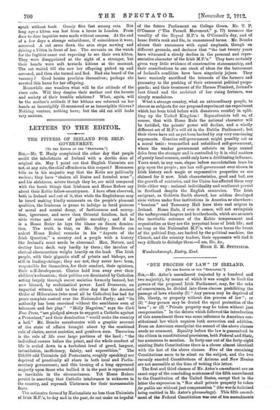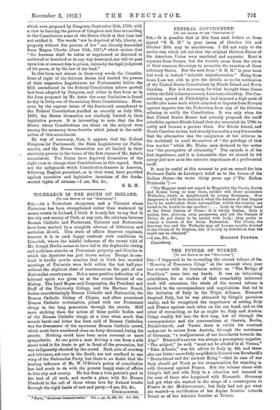"DUE PROCESS OF LAW" IN IRELAND. [To ma EDITOR Of
TUE "SPECTATOR."] SIB,—.61r. Astor's amendment (rejected by a hundred and two majority), by means of which it was sought to limit the powers of the proposed Irish Parliament, may, for the sake of convenience, be divided into three clauses prohibiting the passage of laws whereby (1) "Any person may be deprived of life, liberty, or property without due process of law " ; or (2) "Any person may be denied the equal protection of the laws " ; or (3) "Private property may be taken without just compensation." In the debate which followed the introduction of this amendment there was some reference to American con- stitutional law which requires both correction and addition. From an American standpoint the second of the above clauses needs no comment. Equality before the law is guaranteed to the citizen in constitutional provisions, both Federal and State, too numerous to mention. In forty-one out of the forty-eight existing State Constitutions there is a clause almost identical with the last of the above clauses. Five of the remaining Constitutions seem to be silent on the subject, and the two recently enacted Constitutions of Arizona and New Mexico are not accessible at the time of writing this letter.
The first and third clauses of Mr. Astor's amendment are an exact copy of the concluding sentences of the fifth amendment to the Constitution of the United States, except that in the latter the expression is, "Nor shall private property be taken for public use without just compensation " (the words italicized being omitted in Mr. Astor's phraseology). This fifth amend. meat of the Federal Constitution was one of ten amendments
which were proposed by Congress (September 25th, 1789), with a view to limiting the powers of Congress and thus reconciling to the Constitution some of the States which at that time had not ratified it. The words "nor be deprived of life, liberty, or property without due process of law " are directly descended from Magna Charta (June 15th, 1217),* which recites that " No freeman shall be taken or imprisoned or disseised or outlawed or banished or in any way destroyed, nor will we pass upon him or commit him to prison, unless by the legal judgment of his peers, or by the law of the land."
In this form and almost in these very words the Constitu- tions of eight of the thirteen States bad limited the powers of their respective Legislatures (or Parliaments) before the fifth amendment to the Federal Constitution (above quoted) had been adopted by Congress, and either in that form or in the form proposed by Mr. Astor the same limitation is found to-day in forty-one of the existing State Constitutions. More- over, by the express terms of the fourteenth amendment to the Federal Constitution (ratified as recently as July 28th, 1868), the States themselves are similarly limited in their legislative powers. It is interesting to note that the five States whose Constitutions are silent on the subject were among the necessary three-fourths which joined in the ratifi- cation of this amendment.
By way of summary, then, it appears that the Federal Congress (or Parliament), the State Legislatures (or Parlia- ments), and the States themselves are all limited in their statutory powers in the terms of the first clause of Mr. Astor's amendment. The States have deprived themselves of the right even to change their Constitutions in this regard. Such are the safeguards which Constitution-framers in America, following English precedent, as is their wont, have provided against executive and legislative invasions of the funda- mental rights of citizens.—I am, Sir, &c., S. R. H.



























































 Previous page
Previous page